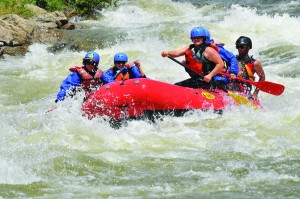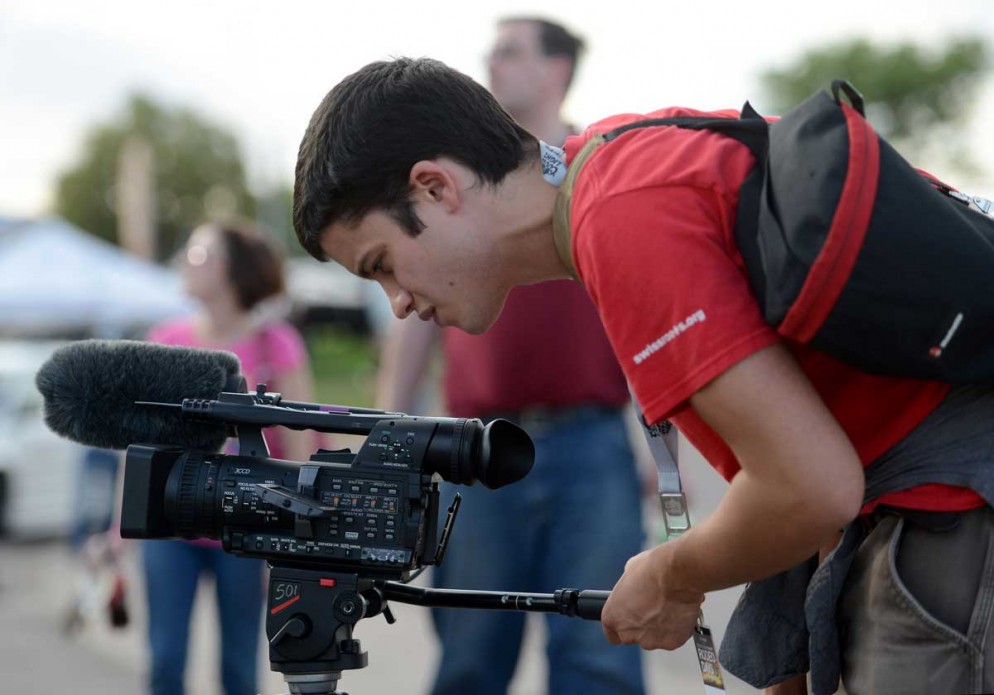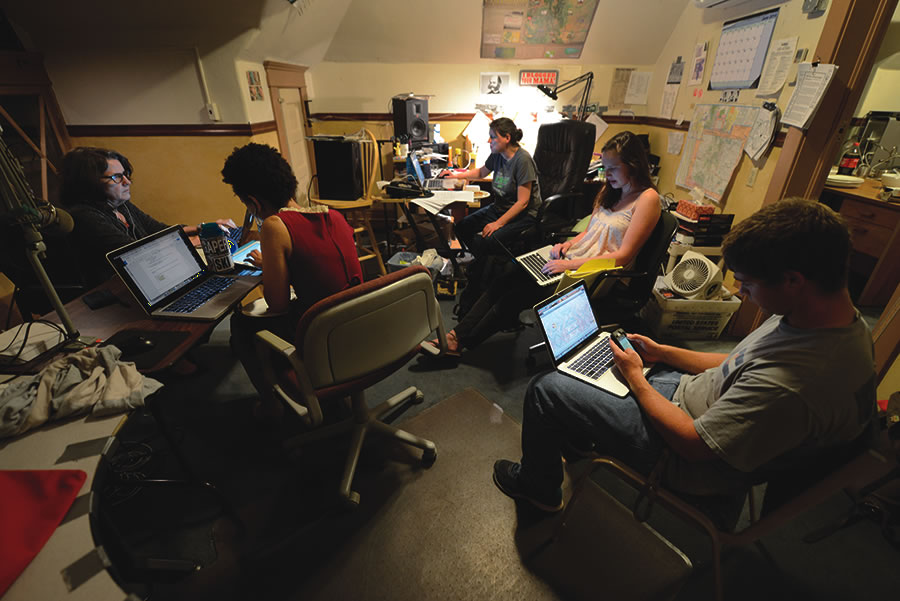With the rigor and adventure inherent in the CC Block Plan and our awe-inspiring location in the Rocky Mountains, Colorado College is poised to make summer academic programs the destination for a new generation of learners.
Colorado College has a long tradition of extending learning opportunities for students during the Summer Session, taking advantage of the beauty of our location during the summer months. As early as the 1960s, Summer Session developed eight-week long courses, or institutes, in the fine arts, field studies, and graduate studies for teachers.
Although the graduate institutes have remained, over time the undergraduate schedule in the Summer Session has developed into more single-block courses.
This summer, the college launched a return of extended summer study for undergraduates, with three academic programs using linked, thematic blocks — re-igniting summer as a premier learning experience at CC.
The goal of the newly envisioned summer program is to increase flexibility for both faculty and students, provide new revenue to the college, and enhance the liberal arts experience at CC.
A group led by Dean Sandra Wong developed three signature programs for Summer 2014: The Colorado Documentary Institute, The Outdoor Leadership Institute, and The Student Journalism Institute.
The Dean’s Office invited faculty to submit proposals for summer institutes, or linked, thematic blocks, which the college would offer in addition to the single-block Summer Session courses on and off campus.
According to Ann Van Horn ’85, director of the Summer Session, “The idea was to connect a course or courses with an opportunity for research and/or a professional opportunity. Summer is such a beautiful time here; we wanted to explore how we could capitalize on the weather, the mountains, the location, the Block Plan, etc.”
Van Horn said they needed these linked blocks to appeal to both CC students and students from other colleges.
The Documentary Film Institute, taught by CC film professors Clay Haskell and Dylan Nelson, consisted of three components: fundamental knowledge, experience through externships, and storytelling. Fourteen students enrolled in the course.
The institute provided students with a rigorous and creative filmmaking education bridged by a real-world professional experience. Students created their own films while examining the history, codes, and conventions of the documentary form. Students also participated in an externship at a local nonprofit that inspired their final projects: short films about Colorado society, history, or culture.
The completed films were submitted to Rocky Mountain PBS to be considered for public television broadcast – and all 12 films produced in the summer course were accepted. The students currently are making changes and will resubmit the films to PBS early in the year for programming.The Rocky Mountain Women’s Film Festival showed two of the films at its festival in November. They were “Duke of the Chutes” by Dan Levitt ’15, and “On Track” by Robert Mahaffie ’15. Additionally, Levitt’s film was scheduled to screen at the ProRodeo Nationals in Las Vegas this fall. Finally, “Zinester,” by Jacob “Djake” Carroll ’16, was the subject of an article in Westword and recently screened as part of the reopening celebration of the Denver Zine Library.
“It was eye-opening when I got to go deeper with my work,” Carroll said. “The only reason the film I made ended up being something watchable was because I had the time to try a couple of things that failed and I wouldn’t have had time if it were during the year.”
Van Horn said the film institute was a great success.
“It worked out beautifully. This institute was able to incorporate a research component as an externship. All the students got out into the community, into nonprofit organizations, and researched the stories they were pursuing. This provides an essential ‘link’ to where we live. With two full blocks students could reach out beyond the confines of the CC community to tell stories, using the extra time to refine their films,” she said.
 The Outdoor Leadership Institute, taught by Professor of Chemistry and Environmental Sciences Howard Drossman and Zion Klos ’09 in collaboration with the Colorado Outward Bound School, took full advantage of summer in the Rocky Mountains. The interwoven block courses provided a balanced perspective of the natural sciences blended with research and learning about outdoor and environmental pedagogy.
The Outdoor Leadership Institute, taught by Professor of Chemistry and Environmental Sciences Howard Drossman and Zion Klos ’09 in collaboration with the Colorado Outward Bound School, took full advantage of summer in the Rocky Mountains. The interwoven block courses provided a balanced perspective of the natural sciences blended with research and learning about outdoor and environmental pedagogy.
It represented a collaborative, interdisciplinary adventure for those interested in educating youth about the outdoors and provided the next step for environmentally minded students to begin a fulfilling career after college.
An intensive 10-day Wilderness First Responder (WFR) course was taught on the CC campus. Finding the Green River Basin focused on developing interdisciplinary knowledge in the sciences and outdoor leadership through place-based exploration. During this three-and-a-half-week expedition, students spent six days backpacking along alpine headwaters of the Uinta Mountains, followed by 18 days of whitewater paddling through the heart of Utah’s canyon country as they followed the Green and Colorado rivers. The course was designed to build practical abilities in the use of the scientific method, integrative thinking, quantitative analysis, and effective communication, while also providing students an opportunity to build their skills in group leadership, backcountry living, risk management, and technical river travel. Lastly, Environmental Education students returned to Catamount Institute near Woodland Park, Colo., to prepare for and participate in an internship as environmental educators and complete their portfolios, which were submitted to the Colorado Alliance of Environmental Educators for certification approval.
CC student Abigail Philbrick ’17 participated in the Outdoor Leadership Institute. She said the program gave her a better understanding of what it is like to actually work in environmental and outdoor education, as opposed to simply learning leadership skills in the backcountry.
“I was able to get 2.5 credits at CC, which I need to get caught up as a winter start student. I was also able to get my WFR certification. This course made me more capable of getting jobs in my areas of interest this summer and beyond as I pursue the outdoor education and adventure field,” Philbrick said.
Although only four students completed the entire institute, 11 students took part in at least one part of the linked block experience. “The enrollment was a disappointment,” said Van Horn, “but we learned something about what disciplines might not overlap well to attract a broad audience.”
In The Student Journalism Institute, taught by former journalist and block visitor Diane Alters, students learned the key elements of research, reporting, writing, and editing, emphasizing ethics issues and use of the standard news conventions of The Associated Press Stylebook and Libel Manual. In addition, students learned to use research tools such as databases, basic web design, and social media. At the same time, through readings and class discussion, they gained an overview of journalism and its role in society. The class also focused on interviewing and documentary skills to tell the stories of people on the Front Range who are involved with the issues uncovered in reporting and research.
While in the course and afterward, students also worked at various news jobs as interns and trained with professional editors, investigative reporters, designers, and visual journalists.
Van Horn said the students learned a great deal and had valuable experiences. However, she said that questions remain about how to successfully integrate internships within the context of an academic course, including funding and credit. Additionally, faculty have questioned whether an internship can be available for every student in the class.
Dana Cronin ’17 learned the correct techniques of journalism from experience gained in the journalism institute, and later used them in her internship.
“It showed me that journalism is not an intuitive thing; you have to be actively involved in your story and the truth behind it. One of my favorite parts was applying everything I had learned to my internship and feeling very prepared for the work,” Cronin said.
Last summer was only the beginning for this summer academic experience, Van Horn said.
“This summer we hope to offer academic experiences and professional opportunities that expand upon what we learned in 2014. We hope to give students flexibility, provide liberal arts coursework that is well-suited to professional opportunities and research, and allow students to take advantage of our fabulous Rocky Mountains in the summer. We would like to bring in more non-CC students, so we’ll be doing our best to get the word out broadly.”

